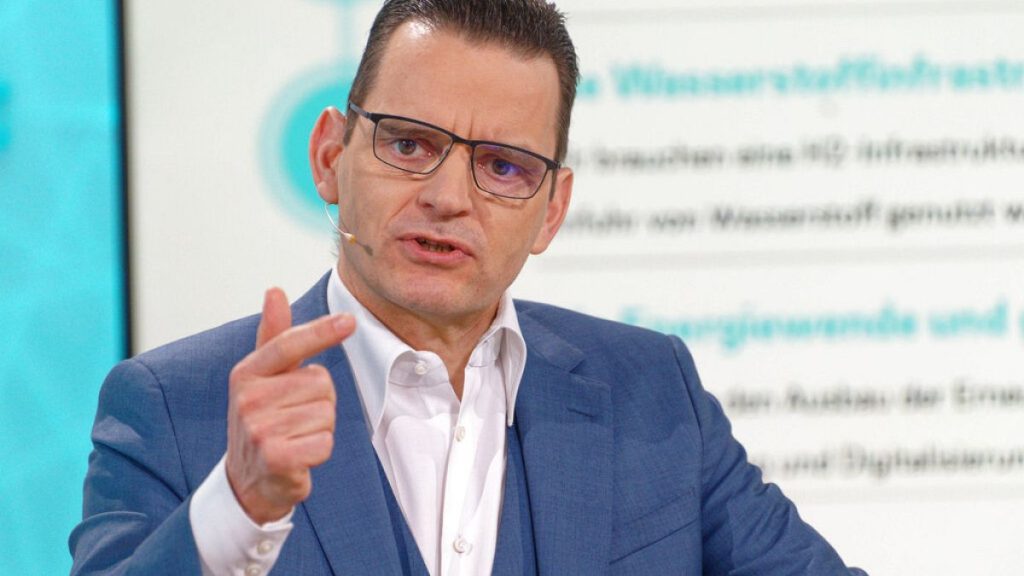Summarize this content to 2000 words in 6 paragraphs
With electricity set to play an ever more central role in Europe’s energy system, the trade association Eurelectric has called on Brussels to urgently update a security of supply strategy that dates back to 2014.
Soaring costs linked to rocketing gas prices after Russia’s invasion of Ukraine and, more recently, suspected sabotage of undersea power lines have underlined the need for the EU to overhaul its decade-old European Energy Security Strategy, electricity companies have warned.“With the threats faced by our sector, security of supply is becoming an urgent priority that policymakers and regulators must acknowledge,” president of the trade association Eurelectric Leonhard Birnbaum said today.Birnbaum was in Bavaria to present a study commissioned from consultancy Compass Lexecon as world leaders convened for the high-stakes Munich Security Conference against a backdrop of an incipient trade war and US moves to take control of negotiations with Russia to end its war of aggression.It was the first time the electricity sector has been present at the annual conference, Birnbaum said, with previous energy discussions having centred around oil and gas. “We wanted to raise awareness that, actually, the critical carrier of energy in the future is electricity,” he said.“We are just a small sideshow of the big geopolitical show,” added Birnbaum, who is CEO of the German electricity firm E.ON, acknowledging that political discussions about the war on Ukraine were “much more important”.“Nevertheless, I think that just by being here and publishing the report in the context of the Munich security conference, we are able to elevate the acknowledgment that something needs to be done,” he said.As well as addressing the hybrid threat of physical attacks – meaning military action and sabotage – and cyberattacks, Eurelectric also reiterated the need to bolster power grids and increase flexibility of demand as more and more variable renewable generation capacity is brought online.“I would argue that the cyberthreat is the more imminent threat for Europe than the physical threat,” Birnbaum told reporters. “And hopefully that remains for quite a while.”The EU was already banking on a massive roll-out of wind and solar power as part of its strategy to reach net-zero emissions by 2050, and raised near-term deployment targets immediately after the Kremlin launched its all-out invasion and weaponised gas supplies. The European Commission is working on a plan to end all Russian fossil fuels imports by 2027, but a new energy security strategy was not listed in the 2025 work programme the Commission published this week.When contacted by Euronews, a spokesperson for the EU executive recalled that president Ursula von der Leyen had, however, addressed the issue in her mission letter to the EU’s new energy commissioner Dan Jørgensen.The Danish commissioner has been tasked with adapting the current security framework to “the geopolitical context and the electrification of the EU’s energy system” while paying “close attention to emerging risks, such as climate change impacts, cyber-attacks and critical infrastructure”.The Eurelectric report also points to the issue of raw materials supply, which Brussels has already recognised in a Critical Raw Materials Act adopted last year. Growing trade tensions have added to the impetus to ensure supply chains of materials essential to the energy transition, notably the lithium used in car batteries.Renewables targets were raised in the EU’s wartime plan to ‘repower’ the union, and call for a near doubling of deployed wind and solar by 2030. The industry association WindEurope warned this week that many European governments were still being too slow to grant planning permission to new wind farms, a problem the industry has long blamed for stalling deployment.“Look how it’s worked in Germany – they’re now permitting seven times as much wind as five years ago,” the lobby group’s CEO Giles Dickson said. “And it’s not cost money – they’ve just put three words ‘overriding public interest’ in their laws and made sure the courts apply them.”Eurelectric’s Birnbaum was adamant the urgent need to bolster domestically produced energy would not mean a return to coal – the only fossil fuel that is abundant within the EU.“It’s just not going to happen – the economics and the innovation are clear,” he said. “In the meantime, as long as we have them, those fossil [fuels] obviously provide resilience, but we will eventually be forced to have this resilience even without them.”
Keep Reading
Subscribe to Updates
Get the latest creative news from FooBar about art, design and business.
© 2026 Globe Timeline. All Rights Reserved.












